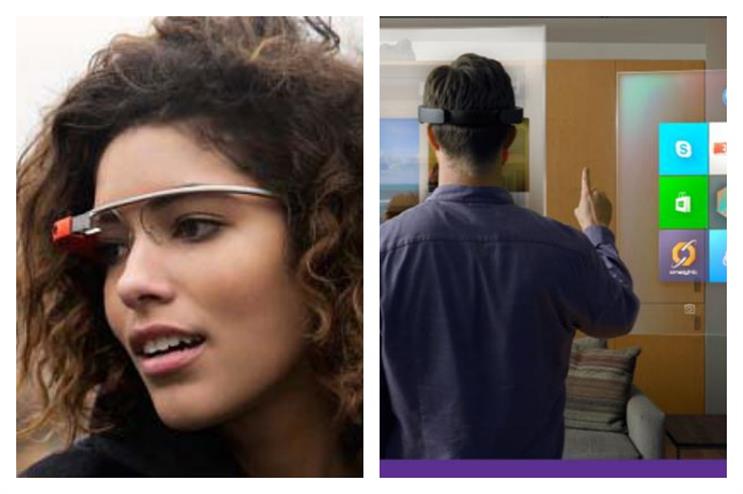
Ben Trewhella, managing director of Opposable Games

"Where Google Glass is an information-only display off to one side, like sunglasses, Hololens and other headsets take over most of the users vision, allowing the user to still see the real world overlaid with 3D images projected onto tables, walls, and around other objects. For brands, this means being able to take people into immersive experiences where their own reality is changed, where anything they look at can be augmented or transformed.
"For retailers, marketers, advertisers, events; all can give each customer a truly unique visual experience from the moment they walk in the store, look at the product, or any other daily experience. This goes beyond Google's first experiment with Glass, which is stuck providing notifications with awkward voice control.
"Right now the Hololens is still a prototype, but the tech world is on the verge of making virtual and augmented reality because everyone who tries on the tech can't stop imagining new ways to use it, and we all glimpse the next step on from mobile and wearable computing. Google clearly agrees as it is investing heavily in Magic Leap, which has a potential similar to Hololens."
Solomon Rogers, founder and managing director of Rewind FX

"Google Glass set out across uncharted territory as a true pioneer, searching for the untapped land of wearables. Without its forward-thinking attitude and bravery we would not be experiencing the current explosion of new, innovative and ever-expanding ranges of wearable technology. It's groundbreaking, always connected heads-up display (HUD) allows for discreet use and at all times connecting you to anyone and everything via the internet. It has had such a profound influence that it is even considered a fashion item.
"Where Glass really shines is in it's ability to be worn at all times, allowing the user to go about their day or activity without the addition of a bulky headset or the need to be tethered to a computer. It is a fully functional device with its own apps, but it really shines when paired and synced to a mobile phone. This pairing allows for it to perform live alerts from most phone services and also provides it with a direct connection to the internet.
"Brands have connected with Google Glass users through various bespoke and innovative apps - teaching, guiding, or just purely entertaining them. For example, Tesco let you scan a product's barcode using the Google Glass' built-in camera, or even using a voice activated search to add it to your online basket. Virgin Atlantic recently used Glass to allow it's staff to check-in customers without breaking eye contact. Mercedes developed an app to give users walking navigation to their car, and then turn-by-turn navigation from the car's in-built satnav to their chosen destination. And even golfers can see a real-time map of where they are on the course and guidance on the appropriate club to choose.
"Glass has its big advantage over Hololens in it's small-form factor and unobtrusive design, allowing it to be viable all-day option. It looks good, and is even seen as a true fashion item. The form factor of the Hololens is so large that it almost completely covers the user's face. Whilst it's technology for augmenting reality is astounding, what is the cost to the user? It is going to take a long time to be accepted into everyday use (if at all), and particularly in public spaces. It remains to be seen how HoloLens can work for any type of meaningful real-world interaction between its users, particularly as the user’s eyes are partially hidden behind a mask. This seems like a crucial oversight given how much human non-verbal communication is via the eyes. In this respect Google Glass has a significant advantage.
"It is true HoloLens will give an individual user an exceptional augmented reality experience, and potentially a shared experience when combined with others using Hololens technology at the same time, but it risks blocking out or even ostracising anyone with one from daily life. Imagine that half the people around you were wearing masks where you couldn't fully see their eyes. Wearables need to enhance our lives in all areas, not at the detriment of some."
"Google's investment in Magic Leap clearly shows the evolution of the Glass technology and concept. This next level is where augment reality as a wearable will truly take-off. If all rumours of this technology are to be believe, expect there to be a serious technology showdown."
Read more:
What do you think? Comment below to let us know.
For more in-depth and print-only features, showcases and interviews with world-leading brands, don't miss the next issue of Event magazine by .

